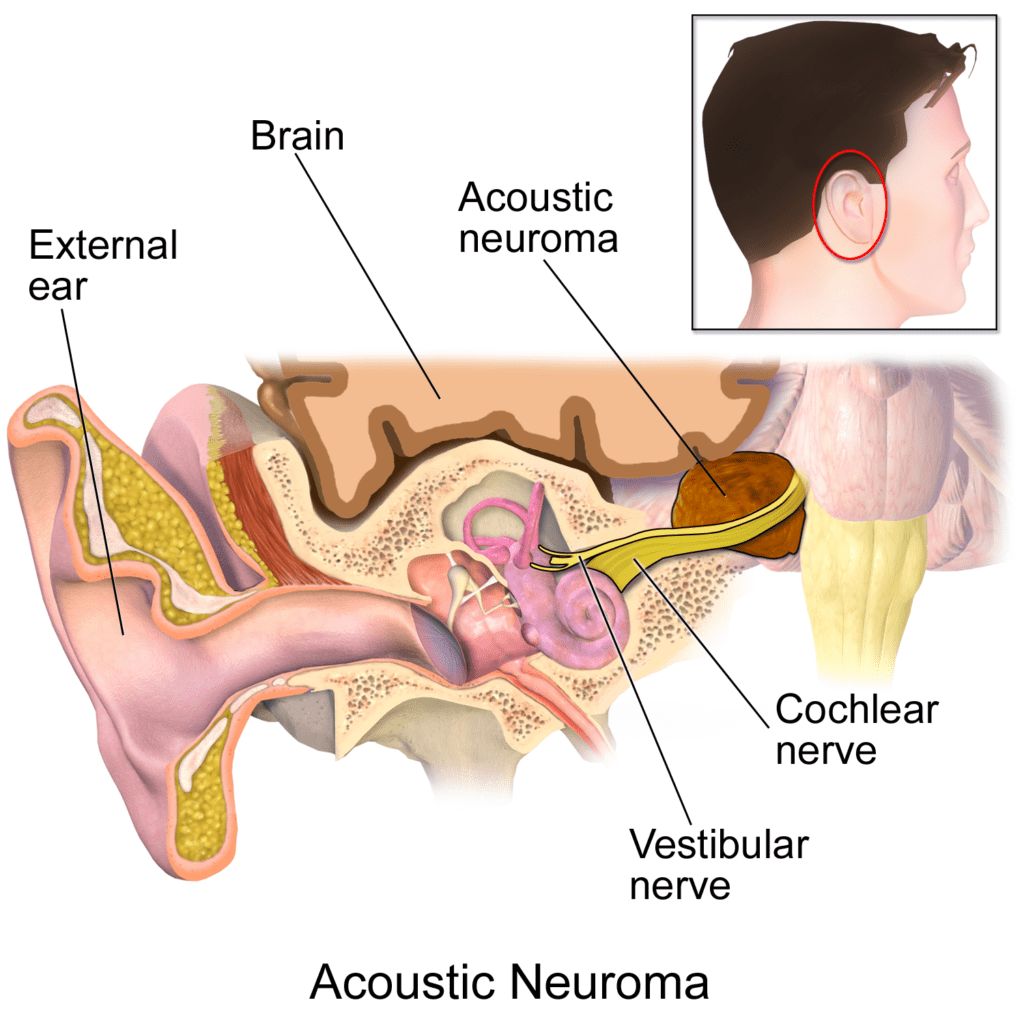ACOUSTIC NEUROMA
What Is Acoustic Neuroma?
Acoustic neuroma, is a noncancerous -benign- brain tumor that arises from the vestibular portion of the eighth cranial nerve, that usually grows slowly or not at all, and does not spread to other parts of the body. Acoustic neuromas also known as vestibular schwannoma, typically grows on, from the central nervous system transitions through the peripheral nervous system.
Acoustic neuroma affects directly to the nerves that are used for hearing and balance, so acoustic neuroma can cause hearing loss, ringing in your ear and unsteadiness.
In some cases acoustic neuroma may grow rapidly. This is very rare but possible. As they become large enough, they may press against the brain and interfere with vital functions but as the individuals are under control most are picked up and treated before they reach this stage.
What Causes Acoustic Neuroma?
There is no obvious cause of acoustic neuromas but it is sometimes related with genetic background of the individual. Neurofibromatosis type 2 usually involves the development of tumors on the hearing and balance nerves which is so similar to the Acoustic neuromas. According to some studies the individuals with neurofibromatosis type 2 genetic background are possible candidates of Acoustic neuromas.
What Are The Symptoms Of An Acoustic Neuroma?
Acoustic neuromas often grow on the balance and hearing nerve. One-sided hearing loss is the most common symptom of an Acoustic Neuroma.
Other common signs and symptoms of acoustic neuroma, that may occur in the early stages includes;
- Tinnitus: Ringing in the affected ear
- Unsteadiness or loss of balance
- Vertigo
- Ear Fullness: Individuals might have a sensation of fullness in the ear, as if there is water in it.
Other common signs and symptoms of acoustic neuroma, that may occur as the tumor grows includes;
- Hearing loss: In rare cases it happens suddenly but most in common hearing loss usually gets worse over months to years. Hearing loss caused by acoustic neuroma is more severe on one side and usually seen in the affected ear.
- Vision Problems: Temporary blurred or double vision may occur as the tumor gets bigger.
- Numbness, pain, spasms, weakness or paralysis on 1 side of the face as the acoustic neuroma gets worse…
- Change in taste and tear production: Acoustic neuroma may cause pressure on the nerve can cause dry eye or even unexpected tears, as well as changes in taste perception.
- Ataxia: Rare but possible there may be limb coordination problems on 1 side of the body
- Headache and pressure: As the acoustic neuroma grows, the individuals may experience headache and pressure on one side of the head. The pain is usually described as aching or dull headache from neck to top or front of the head.
- Nausea, vomiting, a hoarse voice or difficulty swallowing are also common symptoms of acoustic neuroma, that may occur as the tumor grows…
Treatments For Acoustic Neuromas In Turkey (Türkiye)
There are several different options for Acoustic Neuromas treatments in Turkey (Türkiye); monitoring, surgery or stereotactic radiosurgery. The choice of surgical approach of Acoustic Neuromas treatment in Turkey depends primarily on the size of the tumor, its location, and the status of hearing in the involved ear.
The diagnosis of acoustic neuromas is best made with Gd-enhanced magnetic resonance imaging (MRI).
Acoustic neuromas affect both men and women and starts to be diagnosis at age of 40s or 50s. It is rare among the children. Only the ones associated with a genetic disorder called neurofibromatosis type 2 (NF2) may experience acoustic neuromas in their childhood.
Acoustic Neuromas surgery in Turkey (Türkiye) is performed with high success rates. Operative mortality is very low. The most common sources of morbidity are hearing loss and facial nerve dysfunction.

